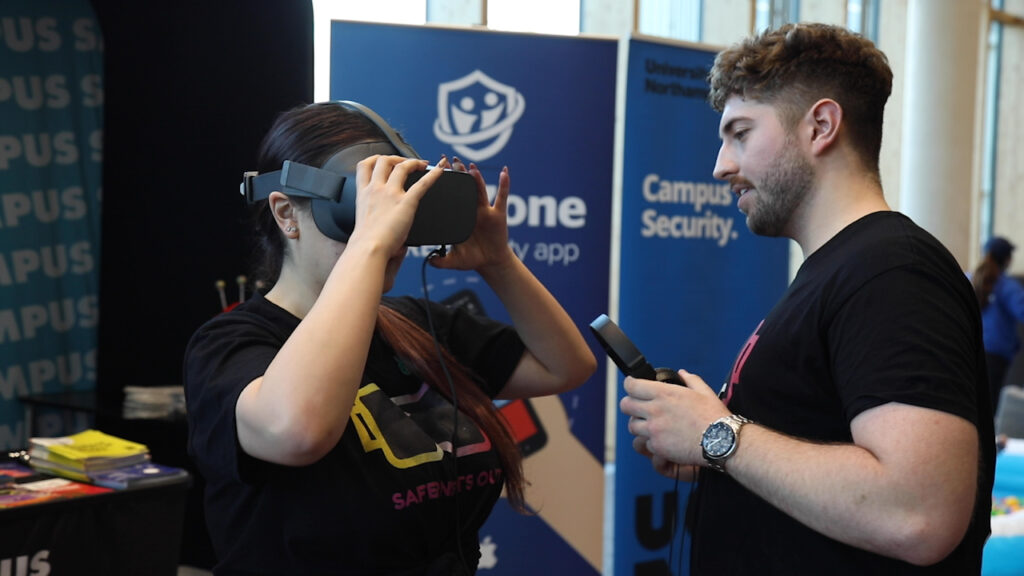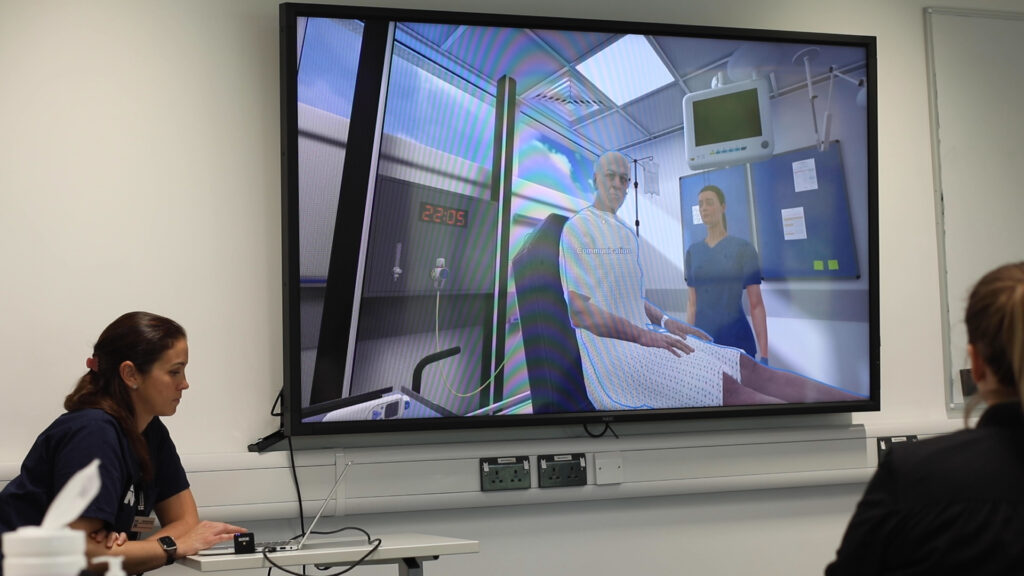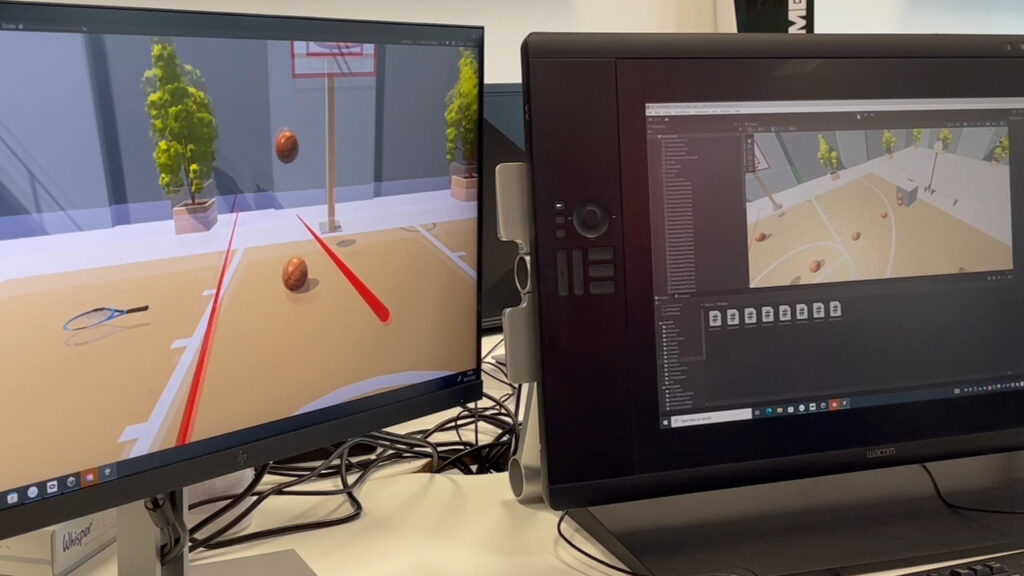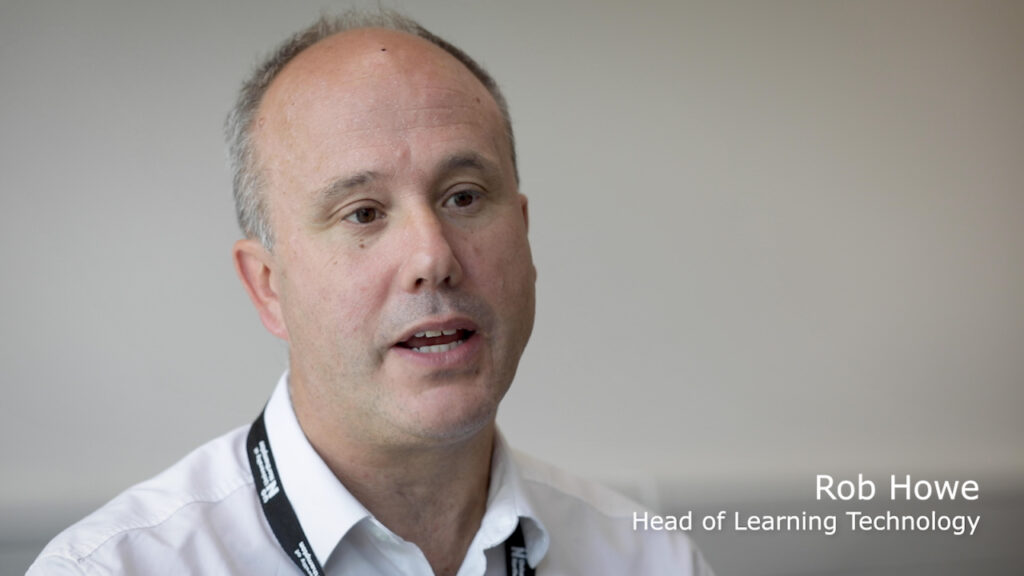Virtual reality (VR) and augmented reality (AR) are quickly gaining traction at the University as effective technologies for teaching and learning.
With VR in particular, it is tempting to imagine a world in which students fit their headsets for a complete University experience. However, as these four films show the reality is more interesting at UON with academics exploring how these technologies can be used in a wide range of creative ways in the classroom.
The first film explores how in 2022-23 Senior Lecturer in Marketing Kardi Somerfield worked with the Police Fire and Commissioners office on a live VR brief to create a virtual reality scenario to promote safer student experiences in Northampton.
(Click the images or text links below to launch the videos in a new tab)

Video: Interview with Kardi Somerfield – Safer Northampton VR Project Duration: 3.55
Using a RiVR Link system the Second-year Digital Marketing students conceptualised, planned, recorded, edited, and released their unique VR experience with accompanying branding including flyers, T-shirts, and signage.
The project was launched to widespread acclaim and media attention, providing the students with highly valuable digital skills. It is an exemplar of how VR technologies can be used creatively as content creation tools in subject areas that are non-technical.
The second film looks at how the subject area of Health is using VR and XR technologies. Sims Lead Kate Ewing and Nursing Senior Lecturer Hannah Cannon discuss how VR software is helping to develop nursing students’ critical skills through the use of interactive hospital scenarios. The simulation tools are used in combination with debriefing discussions that provide rich learning experiences matching the tutor’s individual learning outcomes.

Video: Interview with Kate Ewing and Hannah Cannon on Developing Health Simulations. Duration: 7.41
Our next video case study focuses on how Senior Lecturer in Games Design David Nicholls works with his students to create prototype VR games. He discusses how VR and XR are areas that are both very popular with students and have huge potential for their future employability. So much so, that he is currently collaborating on the development of VR projects across multiple subject areas within the University.

Video: Interview with David Nicholls on use of VR in Games Design. Duration: 2.17
And finally, the last film in this series looks at how the University’s CENTRE FOR ACTIVE DIGITAL EDUCATION (CADE) has launched a number of Special Interests Groups (SIGs) for new technologies such as XR (including MR, VR and AR), Artificial Intelligence (AI), Distance Learning (DL) and Game-Based Learning (GBL).

Video: Interview with Rob Howe on CADE and VR special interest groups. Duration 2.42
Head of Learning Technology Rob Howe explains that CADE is a platform for creative discussion on the teaching and learning opportunities afforded by these extended reality technologies, and how by taking a strategic approach to the development of XR and working collaboratively more students and staff will benefit from our expanding expertise in this area.
For more details on the CENTRE FOR ACTIVE DIGITAL EDUCATION (CADE) and to join the discussions please see: https://www.northampton.ac.uk/research/research-institutes-and-centres/centre-for-active-digital-education-cade/
Lecturer in Digital Education at the University of Hull

The recording of the event (49 mins) held on 23rd March, 2022 is available to view.
The slides from the session are available to download
The Padlet from the session is available for contributions.
For more information on the Detect project
In this presentation Dr Gouseti considered why supporting teachers and students with developing critical digital literacies (CDL) appears to be more timely than ever and she presented a new framework of critical digital literacies created by the DETECT Erasmus+ project. This conceptualisation of critical digital literacies builds on other relevant frameworks but it also introduces a more open-ended approach towards capturing different dimensions that can be associated with CDL practices within and outside formal educational contexts. Furthermore, some project outputs relevant for teachers’ professional development in the area of CDL were discussed during this presentation.
Anastasia Gouseti is a Lecturer in Digital Education at the University of Hull. Her research interests include the use of digital media in educational settings and the role of new technologies in promoting teaching, learning and collaboration. She is currently the Principal Investigator for the Erasmus+ DETECT project which focuses on supporting educators with developing critical digital literacies.
Staff profile: https://www.hull.ac.uk/staff-directory/anastasia-gouseti
Selected publications
Gouseti, A. (2021). ‘We’d never had to set up a virtual school before’: Opportunities and challenges for primary and secondary teachers during emergency remote education. Review of Education, 9(3), https://doi.org/10.1002/rev3.3305
Gouseti, A., Abbott, D., Burden, K., & Jeffrey, S. (2020). Adopting the use of a legacy digital artefact in formal educational settings: opportunities and challenges. Technology, Pedagogy and Education, 29(5), 613-629. https://doi.org/10.1080/1475939X.2020.1822435
Gouseti, A. (2017). Exploring doctoral students’ use of digital technologies: what do they use them for and why?. Educational review, 69(5), 638-654 https://doi.org/10.1080/00131911.2017.1291492
Presentation at: Teaching and supporting a digital future: UoN Showcase 4th February 2022
Wray Irwin talks about Changemaker Support (highlighting how the team supports staff and students’ digital employability)
The recording of the event is available to view
Presentation at: Teaching and supporting a digital future: UoN Showcase 4th February 2022
Simon Wragg Senior Lecturer in Marketing, FBL. – “It’s just a bit of fun! Really…?” Observations on online games in supporting student learning and student experience: Insights from module evaluations.
The recording of the event is available to view
Presentation at: Teaching and supporting a digital future: UoN Showcase 4th February 2022
Kardi Somerfield Senior Lecturer & Course Leader BA Advertising & Digital Marketing, FBL.
Live client project: Building and promoting a Virtual Reality experience for the Campus Security/Police as part of Safer Nights Out Campaign. Using RiVR Classroom in a Box. The promotional video is also available to view.
The recording of the event is available to view
Presentation at: Teaching and supporting a digital future: UoN Showcase 4th February 2022
Tom Briggs (Maths Teacher, Museum Education Consultant & MA Education Student) – Unreinventing the Wheel: an Example or Two (or, “Almost Every Museum Has Had Digital Resources for Years So Why Did They Struggle So Much When the Pandemic Hit?”)
The recording of the event is available to view
Presentation at: Teaching and supporting a digital future: UoN Showcase 4th February 2022
Emma Whewell and Helen Caldwell (Associate Professors) share their recent paper on: Changemakers as digital makers: Connecting and co-creating. Written in collaboration with Mark Frydenberg from Bentley University, Boston USA and Professor Diana Andone, University of Timisoara, Romania, published in Education and Information Technologies (January 2022)
This paper presents data from two international projects focused on the interaction between changemaking and digital making in university students. The data is drawn from the contributions of 63 university students located in the United States, Romania, Spain, Belgium, Norway, Denmark and England. Using a design thinking methodology and a thematic analysis of student responses, the aim was to understand how the creative use of immersive technologies, such as augmented and virtual reality, might create an environment for changemaking practices in an international context. Findings suggest that students demonstrated not only enhanced digital skills and student engagement but increased cultural competence and global mindfulness. International digital collaboration can create conditions for students to develop changemaker attributes and identify as changemakers within the spheres of entrepreneurship and education, preparing them to be a force for change in the world.
The article is available here: https://link.springer.com/article/10.1007/s10639-022-10892-1
The recording of the event is available to view
Presentation at: Teaching and supporting a digital future: UoN Showcase 4th February 2022
Alastair Snook is a year 5 teacher in a Warwickshire state school, and graduate of the University of Northampton, Alastair enrolled on UON’s BA Primary Education course in 2018. He was previously employed in the adult educational technology sector, and his third year research and dissertation focused on opportunities and issues associated with primary school usage of ed-tech. During his degree, Alastair also took part in the DLAB2 Erasmus+ project as a student researcher, which sought to enable pupils and teachers to overcome boundaries via educational technologies. He is a UON graduate and presents his undergraduate dissertation findings.
The recording of the event is available to view
Rob Lambert, Senior Lecturer and Programme Leader for BA Games Design, FAST.
Presentation at: Teaching and supporting a digital future: UoN Showcase 4th February 2022
A dive into the experience of producing a commercial learning product:
3D Gamified training simulation tool for the National Fire Chiefs Council which will educate UK business owners around the laws, protocols and proper conduct relating to fire safety within their premises.
⦁ Getting the project going.
⦁ How we hope to measure the impact of the learning tool.
⦁ How we first intended to gamify learning, how we now intend to gamify learning.
⦁ Production management: Challenges, Milestones and progress, Working with a team of Graduates (925 Studios).
⦁ What may be next?
The recording of the event is available to view
Alison Power, Associate Professor (Learning and Teaching), Senior Lecturer in Midwifery, FHES
Demystifying the Digital World: supporting midwifery students to develop digital competence and confidence
Presentation at: Teaching and supporting a digital future: UoN Showcase 4th February 2022
To meet Professional Standards for pre-registration midwifery education, ‘technology-enhanced [and simulated] learning opportunities’ (NMC, 2019a:10) are embedded in the curriculum in a first-year module which aims to develop students’ digital and technological literacy.
At the start of the module students undertake self-assessments of digital competency using three online platforms (UoN’s Virtual Learning Environment (VLE), the NHS IT Skills Pathway ‘Digital Learning Solutions’ (DLS) and the JISC ‘Building Digital Capability’ website) to identify their digital learning needs. All three platforms then offer a suite of e-learning packages for students to complete, targeting their areas for development. The module is largely delivered online and uses a range of innovative and dynamic learning and teaching approaches for students to engage with both synchronously and asynchronously.
The first cohort to complete the module were asked about their experiences via an online survey and all respondents agreed that the module had been successful in its aim of developing their digital confidence and competence.
The recording of the event is available to view
Recent Posts
- Blackboard Upgrade – February 2026
- Blackboard Upgrade – January 2026
- Spotlight on Excellence: Bringing AI Conversations into Management Learning
- Blackboard Upgrade – December 2025
- Preparing for your Physiotherapy Apprenticeship Programme (PREP-PAP) by Fiona Barrett and Anna Smith
- Blackboard Upgrade – November 2025
- Fix Your Content Day 2025
- Blackboard Upgrade – October 2025
- Blackboard Upgrade – September 2025
- The potential student benefits of staying engaged with learning and teaching material
Tags
ABL Practitioner Stories Academic Skills Accessibility Active Blended Learning (ABL) ADE AI Artificial Intelligence Assessment Design Assessment Tools Blackboard Blackboard Learn Blackboard Upgrade Blended Learning Blogs CAIeRO Collaborate Collaboration Distance Learning Feedback FHES Flipped Learning iNorthampton iPad Kaltura Learner Experience MALT Mobile Newsletter NILE NILE Ultra Outside the box Panopto Presentations Quality Reflection SHED Submitting and Grading Electronically (SaGE) Turnitin Ultra Ultra Upgrade Update Updates Video Waterside XerteArchives
Site Admin

